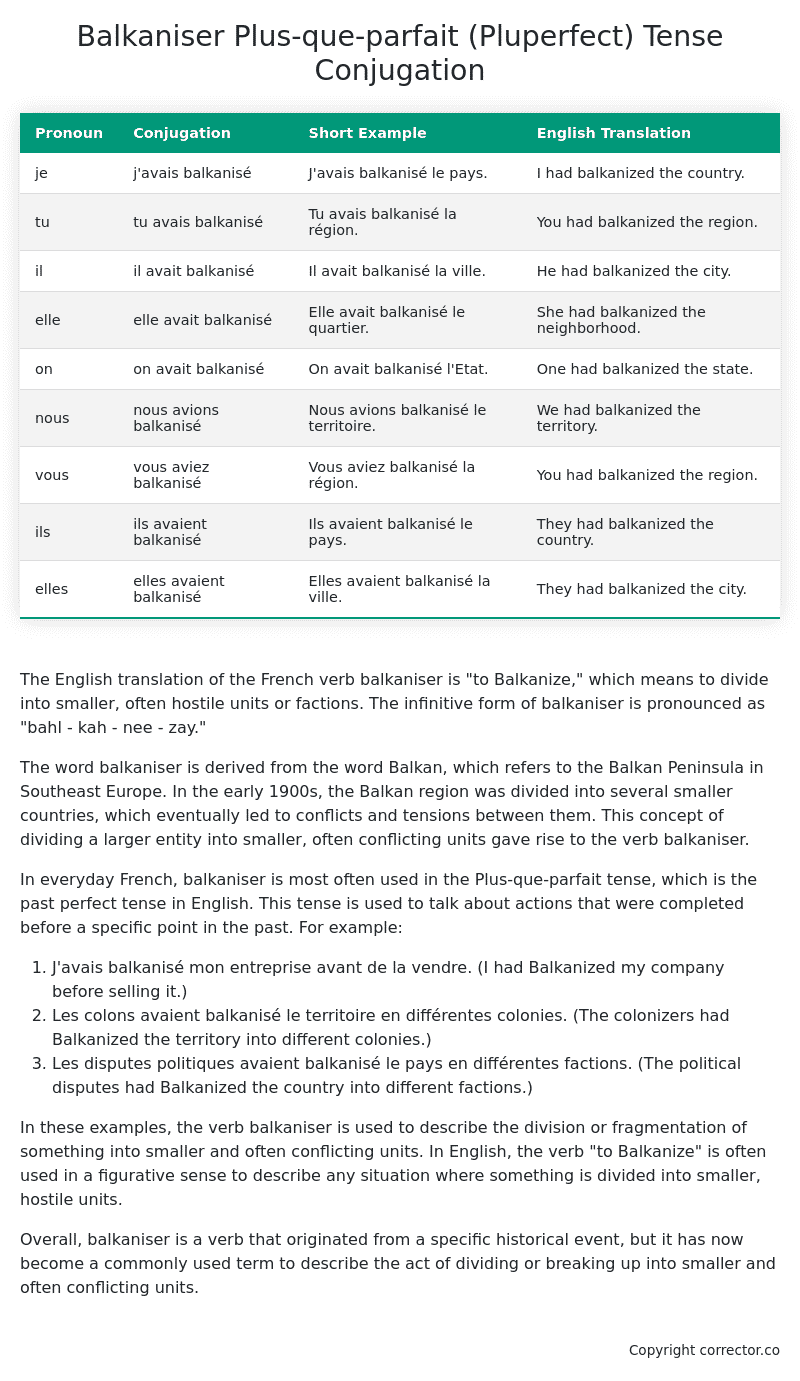Plus-que-parfait (Pluperfect) Tense Conjugation of the French Verb balkaniser
Introduction to the verb balkaniser
The English translation of the French verb balkaniser is “to Balkanize,” which means to divide into smaller, often hostile units or factions. The infinitive form of balkaniser is pronounced as “bahl – kah – nee – zay.”
The word balkaniser is derived from the word Balkan, which refers to the Balkan Peninsula in Southeast Europe. In the early 1900s, the Balkan region was divided into several smaller countries, which eventually led to conflicts and tensions between them. This concept of dividing a larger entity into smaller, often conflicting units gave rise to the verb balkaniser.
In everyday French, balkaniser is most often used in the Plus-que-parfait tense, which is the past perfect tense in English. This tense is used to talk about actions that were completed before a specific point in the past. For example:
- J’avais balkanisé mon entreprise avant de la vendre. (I had Balkanized my company before selling it.)
- Les colons avaient balkanisé le territoire en différentes colonies. (The colonizers had Balkanized the territory into different colonies.)
- Les disputes politiques avaient balkanisé le pays en différentes factions. (The political disputes had Balkanized the country into different factions.)
In these examples, the verb balkaniser is used to describe the division or fragmentation of something into smaller and often conflicting units. In English, the verb “to Balkanize” is often used in a figurative sense to describe any situation where something is divided into smaller, hostile units.
Overall, balkaniser is a verb that originated from a specific historical event, but it has now become a commonly used term to describe the act of dividing or breaking up into smaller and often conflicting units.
Table of the Plus-que-parfait (Pluperfect) Tense Conjugation of balkaniser
| Pronoun | Conjugation | Short Example | English Translation |
|---|---|---|---|
| je | j’avais balkanisé | J’avais balkanisé le pays. | I had balkanized the country. |
| tu | tu avais balkanisé | Tu avais balkanisé la région. | You had balkanized the region. |
| il | il avait balkanisé | Il avait balkanisé la ville. | He had balkanized the city. |
| elle | elle avait balkanisé | Elle avait balkanisé le quartier. | She had balkanized the neighborhood. |
| on | on avait balkanisé | On avait balkanisé l’Etat. | One had balkanized the state. |
| nous | nous avions balkanisé | Nous avions balkanisé le territoire. | We had balkanized the territory. |
| vous | vous aviez balkanisé | Vous aviez balkanisé la région. | You had balkanized the region. |
| ils | ils avaient balkanisé | Ils avaient balkanisé le pays. | They had balkanized the country. |
| elles | elles avaient balkanisé | Elles avaient balkanisé la ville. | They had balkanized the city. |
Other Conjugations for Balkaniser.
Le Present (Present Tense) Conjugation of the French Verb balkaniser
Imparfait (Imperfect) Tense Conjugation of the French Verb balkaniser
Passé Simple (Simple Past) Tense Conjugation of the French Verb balkaniser
Passé Composé (Present Perfect) Tense Conjugation of the French Verb balkaniser
Futur Simple (Simple Future) Tense Conjugation of the French Verb balkaniser
Futur Proche (Near Future) Tense Conjugation of the French Verb balkaniser
Plus-que-parfait (Pluperfect) Tense Conjugation of the French Verb balkaniser (this article)
Passé Antérieur (Past Anterior) Tense Conjugation of the French Verb balkaniser
Futur Antérieur (Future Anterior) Tense Conjugation of the French Verb balkaniser
Subjonctif Présent (Subjunctive Present) Tense Conjugation of the French Verb balkaniser
Subjonctif Passé (Subjunctive Past) Tense Conjugation of the French Verb balkaniser
Subjonctif Imparfait (Subjunctive Imperfect) Tense Conjugation of the French Verb balkaniser
Subjonctif Plus-que-parfait (Subjunctive Pluperfect) Tense Conjugation of the French Verb balkaniser
Conditionnel Présent (Conditional Present) Tense Conjugation of the French Verb balkaniser
Conditionnel Passé (Conditional Past) Tense Conjugation of the French Verb balkaniser
L’impératif Présent (Imperative Present) Tense Conjugation of the French Verb balkaniser
L’infinitif Présent (Infinitive Present) Tense Conjugation of the French Verb balkaniser
Struggling with French verbs or the language in general? Why not use our free French Grammar Checker – no registration required!
Get a FREE Download Study Sheet of this Conjugation 🔥
Simply right click the image below, click “save image” and get your free reference for the balkaniser Plus-que-parfait tense conjugation!

Balkaniser – About the French Plus-que-parfait (Pluperfect) Tense
Tense Formation
Common everyday usage patterns
Sequencing of past events
Background information
Hypothetical or reported speech
Interactions with other tenses
Summary
I hope you enjoyed this article on the verb balkaniser. Still in a learning mood? Check out another TOTALLY random French verb conjugation!


